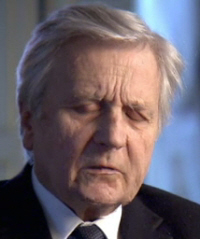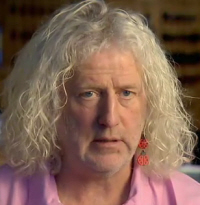Euro Membership Criteria
Fiddling the Books
A late entrant to the euro turned this kind of creative accounting into an art form.
Willem Buiter "Well, clearly a number of countries fiddled the criteria, most countries did, but Greece did it in a heroic way."
Lord Lawson "The Greeks, with the assistance of Goldman Sachs, cooked the books totally."
David Marsh "Even the Germans could only just about fulfil that 3% criteria. They were willing to turn a blind eye to the other countries."
Greece - Sitting Pretty
Gerhard Schröder "If we'd known that Greece's figures were wrong then we'd have made a different decision. But decisions were made
on statistics provided by the European Commission. We have no reason to be suspicious of those figures."
There was also an attempt to prevent members of the euro from borrowing too much after euro was launched. Our stability and growth
pact said annual deficits should never exceed 3% of GDP. But, in an extraordinary move, in 2003, Europe's two most powerful members
killed that rule.

Jean-Claude Trichet
Can I just ask what you emotional reaction was when France and Germany asked for the rules of the stability and growth Pact to
be weakened?
Jean-Claude Trichet "Well, we were, I would say, shocked, of course. We had ourselves expressed a major, major concern. Very
grave concerns, I said. major countries in the euro area had decided that it was not for them and, of course, they had the view
that this pact should be destroyed. I myself explained tirelessly in my own country that you need a framework, you need rules
to be respected and you need surveillance to be sure that the rules are respected. "
Was it a big moment, I mean, in terms of mess we're in now?
Jean-Claude Trichet "I think it was, I think it was a big moment. It was a big moment. Had the major countries continued to
say is essential, we would probably have been in, I would say, a much stronger position when the crisis came."
There was so little to rein in eurozone public spending and borrowing
Willem Buiter
Willem Buiter "It was part of a climate of fiscal permissiveness that allowed advanced economies and their sovereigns to build up
unprecedented peacetime public debt burdens, and that, we now know, is dangerous."
This was an era of cheap debt for households, businesses and governments all over the Western world. Debts soared outside the
euro zone too, in Britain and America. But for the likes of Greece, Spain, Ireland, Portugal and Italy, the cost of borrowing was
made even cheaper by joining the euro.
Louise Cooper
Louise Cooper "Pre the euro, each euro member state borrowed at different interest rates, because their credit risk, their
risk of being able to pay it back or not, was different. Germany – you know they are going to pay you back. Greece – probably
less so. Then the euro was created and suddenly everyone said, 'Well does that mean that Greece's borrowing costs should be
the same as Germany's?' Well, it's one currency. And that's exactly what happened. Sermany's?' Well, it's one currency.
And that's exactly what happened. So, the idea of credit risk for each individual sovereign state went out the window and
every euro sovereign nation could effectively borrow at the same rate as Germany. What that dead for some of these periphery
countries is give them VERY cheap debt and they all went slightly wild on that very cheap debt, and they had a fabulously
cheap debt party."
All this easy money fuelled a frenzied property boom, especially in Spain and Ireland. A small Street in Dublin is one
example of this lethal bubble.
10 years ago, Mike Wallace wasn't a member of the Dail, Ireland's parliament. He was a property developer, looking to
join the growing list of Ireland's multimillionaires by building a little Italy by the Liffey.

Mick Wallace
Mick Wallace "It was originally just a rundown area. There was a couple of old antique shops on the site. People thought
I was mad at the time, building something like this on the north side of the river. ""
Mick bought the site for half a million euros and turned derelict wasteland into apartments, cafes and shops. At the peak
of the market, the 36 apartments on their own were worth 24 million Euros. And across Ireland, house prices more than
trebled between 1995 and 2007. At the height of the boom, more houses were being built in Ireland than in England, with
its population 13 times as great.
Dublin property prices even outpaced those of inflated London.
Mick Wallace "The prices were rising by a couple thousand every week on apartments and houses. It was frightening. People
were queueing to buy apartments and houses, and the prices rising as they were queueing. The people at the front of the queue
of them cheaper than people at the back."
It wasn't just Ireland. in Spain, 5 million new homes were built between 1997 and 2007, increasing the number of homes in Spain
by a quarter. But the increase in Spanish households was just 2.5 million. This building boom was financed by cheap loans from
banks on the lending spree.


